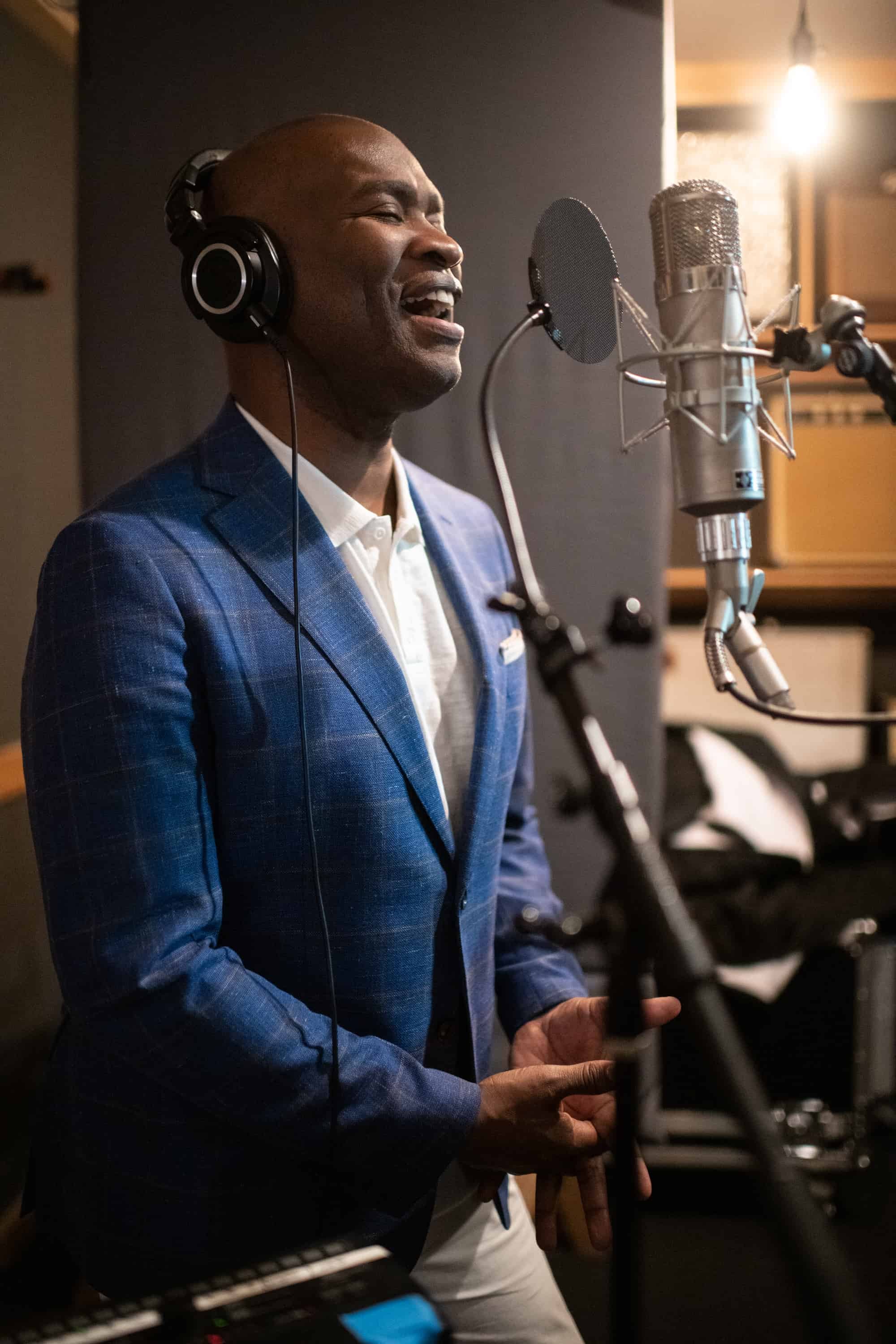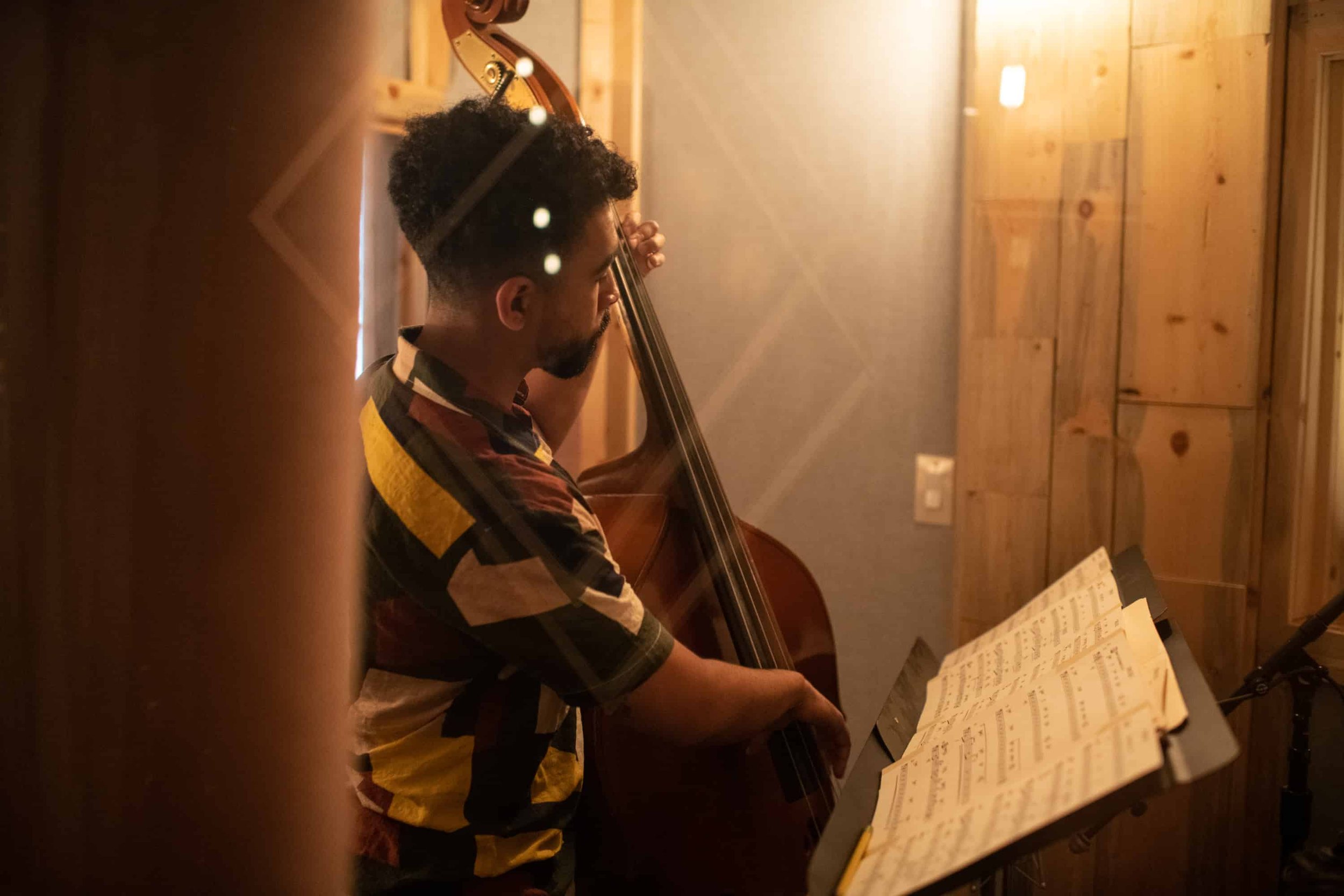
our day
Where to enjoy Our Day :
John Dokes- Vocals
George Gee Swing Orchestra - Featuring:
Anthony Nelson Jr. - Alto Saxophone
Michael Hashim - Tenor Saxophone
Patience Higgins - Baritone Saxophone
Freddie Hendrix - Trumpet
Andy Gravish - Trumpet
David Gibson - Trombone
Steve Einerson - Piano
Malik McLaurine - Bass
Chris Latona - Drums Personnel:
Photos by Jacob Blickenstaff
Mixing by Colin Mohnacs and David Gibson
Engineered By Colin Mohnacs and Glen Forrest
Arrangements by David Gibson
Mastering by David Darlington
Design by Ian Hendrickson Smith
Recorded at GB’s Juke JointRecording SESSION Photos


















Liner Notes:
The final track of John Dokes’ marvelous new album is his impassioned rendition of Bernard Ighner’s ballad, “Everything Must Change.” Proceeding at a brighter tempo than Quincy Jones framed the composer’s own vocal with on the song’s 1974 premiere, Dokes deploys his rich, mellow toned baritone to convey the poignant message of bittersweet acceptance that change is inevitable (“Nothing stays the same... Winter turns to spring, Broken hearts will heal. But never much too soon, They all must change”) with the elegant gravitas and inexorable will to swing that earned him an enthusiastic fan base during the 2010s, when he fronted George Gee’s Swing Orchestra every week before an audience comprised of New York’s most hardcore swing dancers and jazz fans from around the world.
Those characteristics also permeated Dokes’ excellent quintet albums Forever Reasons (2017) and True Love (2019), which featured trombonist David Gibson and alto saxophonist Mark Gross, respectively, as soloists, with an A-list rhythm section of pianist Steve Einerson, bassist Alex Claffy, and drummer Lawrence Leathers. At the end of my booklet notes for True Love, I commented that Dokes intended to follow up with yet another small group recital.
Then everything changed. In June 2019, Leathers died. In March 2020, Covid-19 put public performance on indefinite hiatus. In March 2021, Dokes, who’d spent most of his adult life in New York, moved to Chicago with his wife and two daughters. “On my periodic trips to New York since the move, I’ve sung with George’s band and done small group dates,” he says. . “My first album was a big band album with George (John Dokes Sings, George Gee Swings); I always knew I’d make another. So when I knew I’d be in New York last May, I worked with George and David to bring together guys from the band to record songs we’ve been doing – and doing well – for years, but hadn’t documented.”
Dokes and Gibson (Gee’s musical director and primary arranger since that initial big band album) decided to convene a nonet. “It’s my favorite setup from a big band standpoint because it allows, in my mind, a bit more interaction and playing off each other,” Dokes says.
“I love the nonet format, because it feels like a small group-big band,” Gibson adds. “If I orchestrate creatively, I can make the band sound larger than it is, and I can pass around moments for all the musicians to solo and feel special.”
As the session approached, Dokes asked Gibson to augment his blues-tinged pre-pandemic charts with an arrangement of Billy Ocean’s “Suddenly” he’d generated during the pandemic, and to write new charts for a pair of vocalese lyrics – Jon Hendricks’ for Bobby Timmons’ “Moanin’” and Mark Murphy’s for Freddie Hubbard’s “Red Clay” – that Dokes has performed on Chicago engagements..
Born in Little Rock, Arkansas, and raised in Oakland, California, Dokes remarks that the funky ambiance of “On the Red Clay” “reminds me of the summers I spent with my grandparents in Little Rock, with dirt streets and kids running around.” Blues imperatives also inform “Moanin’”, which, he says, “allowed me to lean into an emotion that’s really about pain. There was a lot going on through Covid. I watched how it changed New York City, how it changed people. There was a lot of angst around it. There was also a lack of connection – you couldn’t see or talk with and perform with people. ‘Suddenly’ also goes back to that moment. When I think about the whole project, it’s about relishing those moments, being in the moment, and trying not to go too much into the future without optimism.”
Dokes’ optimistic perspective also informs his choice of Michel Legrand’s “I Will Wait For You” and the lead-off track, “Our Day Will Come.” He notes that his reference point for the latter song is not Amy Winehouse’s 2011 hit, but the original 1962 release by Ruby and the Romantics that he heard his father – a rhythm-and-blues singer – play during childhood. “It’s about two young, hopeful romantics, thinking about the future,” Dokes says. “It’s also about my hopes for the band and the individual success of the members, and the notion of rooting for things to be better.”
For Dokes, the footprint of Nat King Cole, a prime stylistic ancestor, connects “Almost Like Being in Love,” “L-O-V-E,” “Don’t Blame Me” and “This Can’t be Love.” “One of my favorite movies is Groundhog Day, which ends with ‘Almost Like Being in Love,’ he says. “There are parallels to the repetitive feeling we had during Covid and the hope afterwards.” On a more general note, he adds, the four songs represent “my roots with the band, when I was diving into those types of songs, that I enjoyed listening to and dancing to.”
Whether you’re dancing in your head or on your feet, that sentiment will hold true for you, the listener, throughout the program. “It’s an album that will make you move,” says the one-time Lindy Hop champion. “On some tracks the rhythms aren’t necessarily perfect for swing dancing. But I didn’t want to be constrained by that.”
Hopefully Dokes’ demanding fellow dancers will adjust to – and forgive – his slightly expanded beat palette, while the less kinetic connoisseurs among his fan base will appreciate the evolution of his impeccable, hard-won craft and deep connection to the lineage of jazz singing. Returning to the message of the concluding track: “The young become the old, Mysteries do unfold. Because that's the way of time - Nothing and no one goes unchanged.”
Ted Panken
